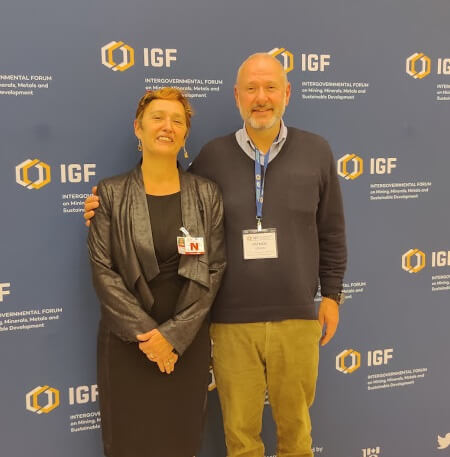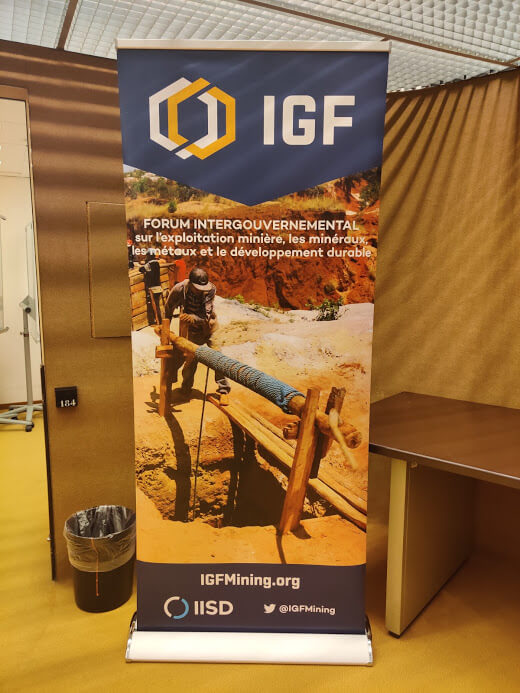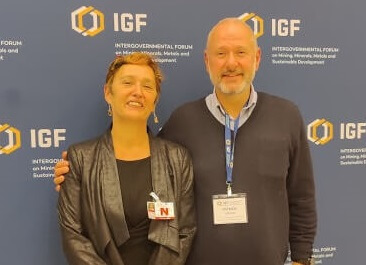Patrick Schein and Maria Laura Barreto, members of the Board of Directors of the Alliance for Responsible Mining (ARM), attended the Intergovernmental Forum on Mining, Minerals, Metals and Sustainable Development (IGF) in order to participate in a global debate on mining for sustainable development.


Patrick participated as a panelist in the forum “Reviewing management policies for artisanal and small-scale mining (ASM) in Africa”, where he had the opportunity to talk about the CRAFT Code and Fairmined Standard and its adapted application in the mining environment of West Africa.
Patrick spoke about the first intervention that was done in West Africa, since 2013, together with Fonds français pour l’environnement mondial (FFEM), Eau Vive and the European Union (EU), and talked about the challenges they faced in intervening in an environment so different from the one before and about the time it took to acquire the necessary experience and information.
In addition, he showed the latest results obtained from the framework of action research on gravimetric concentrator trials with funds from the French decentralized cooperation (community of REIMS and CIEDEL), in partnership with the NGO Eau Vive, in order to show the capacity of gravimetric tools that can exceed mercury-involved performance.
Patrick also had the opportunity to talk about the project recently started in Burkina Faso with the aim of promoting the use of good practices through the creation of legal and viable production and marketing channels.
Another one of the main themes of his intervention was cyanide. He explained that it can be implemented as long as its management is governed by clear handling rules and its use is controlled; He said that one of the most appropriate ways to treat gold in Burkina Faso is through the use of gravimetry with cyanide.
To end his speech, Patrick expressed the need to strengthen the regulatory framework of gold producing countries in order to prevent miners from being victims of the black (illegal) market, as has been proven in countries such as Burkina Faso and the Democratic Republic of the Congo. He added that, without the formalization of the ASM, the fight for the eradication of mercury will be in vain, so it is necessary to legislate to be competitive.


Laura intervened in a session dedicated to the actions initiated by European Partnership for Responsible Minerals (EPRM), during which Virginie Bahon, Head of Corporate Affairs of Valcambi, presented the project under which the Code for Risk Mitigation in Artisanal and Small-Scale Mining, Developing Transparent and Legal Chains (CRAFT) was developed; A tool that helps mitigate ASM’s risks and is a passport for the formal market. She explained that CRAFT is being revised, and after a pilot test that is being done in Colombia, will be applied in countries like Burkina Faso, Costa Rica and in the Republic of Ghana.
On the other hand, Laura talked about the rapid expansion that CRAFT has had and showed the first results of supply chains operating under this framework, in Colombia and Honduras.
Mining in a changing climate
The Annual General Assembly (AGM), which was held from October 7 to 11 at the Palais des Nations in Geneva, focused on mining under a changing climate. It was a very good opportunity for attendees to interact with the governments of the more than 70 countries that are part of the IGF and with representatives of industry, civil society, international organizations, and the academic world.
In addition, this was a space to talk about the formalization of ASM; the best practices for environmental and social impact; innovation and technology; harmonize voluntary sustainability initiatives; local content policies; case studies on mine closure and post-mining transition; and erosion of the tax base and profit change. Some of these issues have a clear dimension for ASM. Laura highlighted this dimension in several sessions through interventions related to the development of business policies and strategies to address climate change that was discussed in section 4. Climate change presents challenges and opportunities for mining companies and their communities, including ASM communities. Therefore, it is important to include ASM in these policies, strategies and plans whenever they are present. On the other hand, the traditional knowledge that artisanal mining communities have about the area and region in which they are working can be of great help when developing these policies, strategies, and plans.

